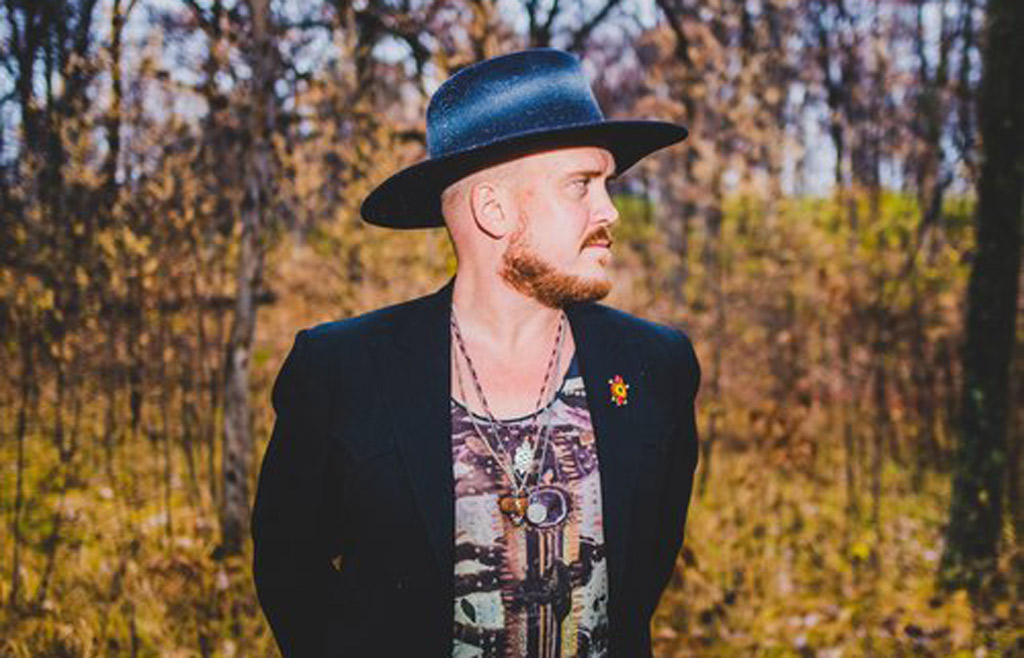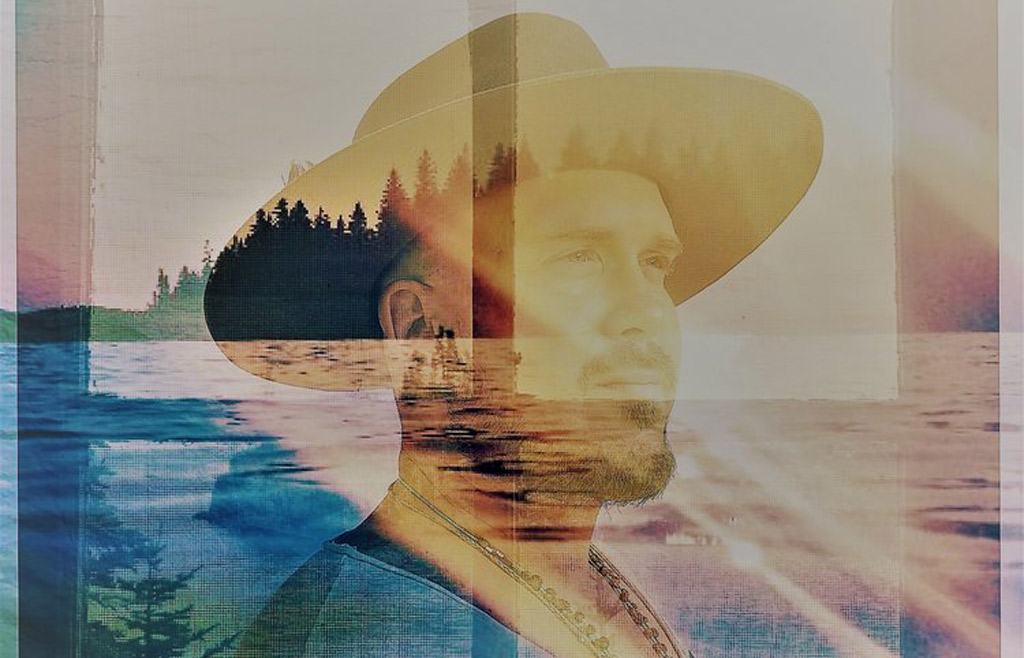
In the fall of 2017, David Huckfelt left behind the familiar—the comfort of his home in Minneapolis; the camaraderie of his critically acclaimed band, The Pines; the luxuries of heat, hot water, and electricity—and relocated to Isle Royale, America’s most remote and least visited national park in mighty Lake Superior. Six hours by boat off the Michigan coast, Isle Royale is the largest island in the world’s largest freshwater lake, an isolated stretch of wilderness seemingly forgotten by the 20th century (to say nothing of the 21st). There, as an Artist In Residence selected by the National Park Service, Huckfelt spent ten hours a day for two straight weeks writing in solitude, channeling the mysterious and lonesome island’s spirits into his stunning debut solo album, Stranger Angels.
“The island is surrounded by 300 smaller islands, decrepit lighthouses and abandoned mines, lined with shipwrecks, ghosts, and the stories of the northern Ojibway, fisherman, and early settlers,” Huckfelt reflects. “I brought a mountain of notebooks and poetry and history books with me,” says Huckfelt, “and for the first time in nearly a decade, I found the solitude, depth, range, danger, beauty, and inspiration to go all kinds of places in my writing that I hadn’t had the space to visit before. With a sense of place so strong, it was less like an anchor and more like a launching pad to free up and access all kinds of places from throughout my life. It’s easy to travel anywhere in your mind in that kind of solitude, your whole experience rises up from the deep.”

Indeed, the music is both transportive and reflective, focused inwards even as it draws on an abundance of outside influence. Hypnotic banjo and gentle acoustic guitar meet trippy public domain samples and shimmering soundscapes underneath Huckfelt’s stark, raw vocals as he wrestles with questions of fate and faith, responsibility and independence, connection and loss. A thread of deep ecology runs through these songs, but not the cute bumper sticker kind, the gritty, “what-comes-next-if-we-don’t-change-our-ways” kind. “Isle Royale used to have fifty wolves in five packs…” Huckfelt says, “now there’s only one left. Cycles are cycles but it’s the height of pride to think we (humans) aren’t the major player.” The title track “Stranger Angels” brings this point home strongest, with the narrator longing for a place “where (he) won’t make the greedy richer,” and the fierce grip of climate change manifests in lyrics like “Wild mustangs starve in the hills outside Las Vegas… and the West is burning like a lake of fire.”
But above and beyond conservation, Stranger Angels is a record about “thin places,” those spiritually charged places where heaven and earth seem to meet and the veil between the world we see and the mystical world beyond becomes transparent. On the rollicking blues-carnival track “As Below, So Above” Huckfelt pays touching to tribute to his late grandmother who helped raise him in Iowa, not by writing about her, but to her, as a defiant elegy against death. A former theology student who once wrote and preached sermons in Cook County Jail in Chicago, Huckfelt has gone through the fire of the niceties and dogma of “heaven” and “god” and come out the other end with a worldview fiercely present, concrete, and expansive. “Stranger Angels as a title, to me, has a thousand references to what’s left after life and death and experience and loss and love burns off all the easy answers…” says Huckfelt. “The idea of god or spirit being hidden under the opposite of what we think we know, of ancestors and spirits visiting us, screaming in our ears all day long, but we miss it because it’s different, stranger than we expected… And the kindness we give and receive from strangers, the least, last, and lost among us. Our cities are overflowing with strange angels, it’s such a mistake when we think we know which or who can offer us something, and which can’t. Every spirit has something to give. Then, when I saw the night camera footage of the moose and wolves on Isle Royale, dancing in the moonlight and gracing the forest with their presence, I thought “stranger angels” indeed.”
The record also draws on deep wells of Native American tradition and spirituality, a life-long anchor for Huckfelt which has developed more fully through working with Native songwriters and poets like John Trudell, Quiltman, Keith Secola, Tom LaBlanc, and more. References to the healing and prophetic prayer-visions of indigenous thought and voices are everywhere on this record, including the chilling, epic, cosmic pow-wow closing track “Star Nation,” with the authoritative voice of American Indian Movement activist and singer Floyd Red Crow Westerman leading the way. Artfully weaving the historical, the ecological, and the personal into an elegant lyrical web, these songs contain layers of surprise and richness, as in the track “Everywind” with Huckfelt turning an imagining of the life of a woman named Everywind from a vintage photograph into a ballad in celebration of all women. The elegant “Still And Still Moving” sparkles like sunlight off the waters of Lake Superior as it ponders mortality and the impermanence of everything around us. “False True Lover Blues” stands as a gut punch at the precise place where a broken heart starts to mend, while “You Get Got” starts with notes Huckfelt took of his grandparents talking in bed after sixty-four years of marriage, and travels in a country-waltz fashion into the political and the universal with some help from guest vocalist Erik Koskinen.
When it was time to record the songs from Isle Royale, Huckfelt assembled a dream team of musicians including drummer/co-producer J.T. Bates (Andrew Bird, Mason Jennings), bassist Darin Gray (Tweedy, William Tyler), and guitarists Michael Rossetto, Erik Koskinen, and Jeremy Ylvisaker, cutting sixteen songs in just three days. Very special guests rallied to Huckfelt’s side, including spectacular performances by Sylvan Esso’s Amelia Meath on “Heart, Wherever,” “Everywind” and “Stranger Angels,” and Trampled By Turtles’ Dave Simonett who contributed harmony vocals on multiple tracks. Other stellar appearances include gospel-blues master Phil Cook on Hammond organ, while electronic musician and sample wizard Andrew Broder (Fog) haunts the tracks with the sparse, mercurial public domain samples of old-world Americana, as if these songs were coming through a Ham radio in an old ghost town.
Stranger Angels follows Huckfelt’s most recent album with The Pines, Above The Prairie (2016). Hailed by No Depression as “dazzling,” it drew the attention of Rolling Stone’s David Fricke, who called The Pines “poignant stark country,” and earned high praise in both the U.S. and Europe. Mojo called it “their most beautiful yet.”
David Huckfelt will be touring Iowa this month, making three highly anticipated stops in Cedar Rapids at CSPS Hall on Saturday, April 20; in Fairfield at the beautiful new Cider House 1949 brewery on Sunday, April 28 (co-presented by Fairfield Muse, with an opening set by Michael Dugan); and at the Grinnell Arts Center on Saturday, May 4.
